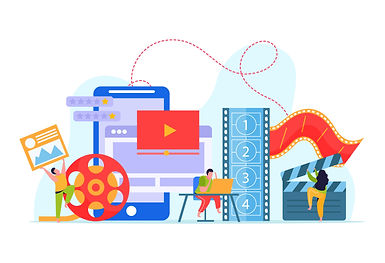Assessment and learning approach models

href="http://www.freepik.com">Designed by gstudioimagen / Freepik
Project-based learning scenario
Students in a film academy are required to make a short film (10 minutes long) as their final work for their semester. To do this they will have to distribute different roles and tasks among themselves, with the aim of making the best short film possible, taking care of every technical aspect of the production.
The roles are many, as are the tasks to be performed: it is necessary to write the screenplay and then direct the short film, select the actors (and act), get the costumes and props, use the make-up, choose the location, take care of the use of lights...
Some students will therefore have the role of screenwriter, others of director or actor, still others will have more technical roles such as set designer, costume designer, make-up artist, lighting technician, sound engineer, camera operator and the post-production roles.
Authentic assessment
-
A general evaluation will take place by group, and will be based on the final material that the students will be able to produce, i.e. the short film itself. This evaluation will be made by their own classmates, with the help of assessment grids designed and provided by the teacher.
-
Students will be also assessed individually, based on their understanding of the overall project and their personal reflections on their specific role in the short movie production. This more specific assessment will be instead responsibility of the teacher alone.
The sum of these two assessments will result in the final grade.

<a href="https://www.freepik.com/free-vector/animation-motion-design-flat-background-with-team-working-computer-creating-animated-video-vector-illustration_26761438.htm#query=short%20movie&position=21&from_view=search&track=ais#position=21&query=short%20movie">Image by macrovector</a> on Freepik
The assessment chosen in this learning scenario is student-centred and authentic. In fact, it focuses on assessing students' learning and understanding of their role within the development of the final product, rather than focusing on simply verifying their ability to memorize information.
Instead of being a simple assessment based on answering multiple choice questions or writing an essay, this type of assessment is designed to allow students to demonstrate their understanding of a topic in a meaningful and relevant way, as well as to build an final concrete product in which to show one's practical skills and competences.
Connection to learning theories
Social constructivism
Students exchange their individual ideas, knowledge and skills. The active collaboration between students is essential for the good realization of the assessment, and this is useful not only for the final evaluation, but for the learning of the students themselves, who enrich their knowledge with the knowledge of their classmates. Learning takes place in a group, in a cooperative way, by passing information and skills from student to student.

<a href="https://www.freepik.com">designed by Pch.vector - Freepik.com</a
Cognitivism
The creativity, planning and problem solving skills of each student are elements that are solicited by the type of evaluation proposed, in each student individually for the success of the final work. A personal reworking of the knowledge acquired during class hours and exchanged with one's classmates is required.
Andragogy
Presumably students are intrinsically motivated and self-directed. The assessment itself is very motivating (making a short film should stimulate students who have chosen to study filmmaking) and the students will devote time, energy and passion to the successful realization of the project.
References
Burden, K. R., & Phillips, K. J. (2015). Project-based learning in the social studies classroom: Engaging students in meaningful learning experiences. Social Studies, 106(2), 57-60. doi:10.1080/00377996.2015.1012467
Barbour, M. K. (2010). Project-based learning in environmental science: The impact of student motivation and attitude on learning. Journal of Educational Research, 103(6), 401-410. doi:10.1080/00220670903216545
Center for Innovative Teaching and Learning. (n.d.). Authentic Assessment. Indiana University Bloomington. Retrieved from: https://citl.indiana.edu/teaching-resources/assessing-student-learning/authentic-assessment/
Magnify Learning. (n.d.). What is Project Based Learning? Retrieved from: https://www.magnifylearningin.org/what-is-project-based-learning